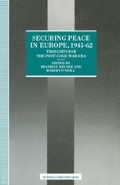Abstract
To understand the basic rationale underlying the Western defence organisations one has to focus on the prime reason Western decisionmakers had to form these alliances, and later, to give the North Atlantic Treaty the military striking power of an integrated organisation. This reason was the Western perception of a Soviet threat. If we want to say anything about the justification and purpose of NATO and the Western European Union (WEU), it is advisable to start by examining the Western idea of this threat, asking how it originated, and whether it was realistic. Once we have identified the roots of this threat-perception, we will have found conditions which have to be fulfilled if the Western security systems are ever to lose their raison d’être.
Access this chapter
Tax calculation will be finalised at checkout
Purchases are for personal use only
Preview
Unable to display preview. Download preview PDF.
Notes
Gavriel Ra’anan, International Policy Formation in the USSR: Factional ‘Debate’ during the Zhdanovshchina, Hamden, Ct., Archon Books, Shoe String Press, 1983.
Cf. Beatrice Heuser, Western ‘Containment’ Policies in the Cold War: The Yugoslav Case, 1948–1953, London and New York, Routledge, 1989, pp. 18–42, 143-8, and see below.
PPS 4 of 23 July 1947, in Thomas Etzold and John Lewis Gaddis, Containment: Documents in American Policy and Strategy (New York: Columbia University Press, 1978), pp. 107–9;.
Beatrice Heuser, ‘NSC-68 and the Soviet Threat: A New Perspective on Western Threat Perception and Policy Making’, Review of International Studies, vol. 17, no. 1 (January 1991), pp. 17–40.
Marc Trachtenberg, ‘A “Wasting Asset”: American Strategy and the Shifting Nuclear Balance, 1949–1954’ in International Security, vol.13, no.3, Winter 1988/89, pp. 5–49
Francis Williams, A Prime Minister Remembers, London, William Heinemann, 1961, p. 170.
While in reality this was not the case — this is one of the few policies of Stalin’s which we can reconstruct. See D. George Kousoulas, ‘The Truman Doctrine and the Stalin-Tito Rift: A Reappraisal’, South Atlantic Quarterly, vol. 72, Summer 1973, pp. 428–39
Svetozar Vukmanovic (‘Tempo’), How and Why the People’s Liberation Struggle of Greece met with Defeat, originally 1950; London, Merlin Press reprint
Beatrice Heuser, ‘Western Diplomats’ Perceptions of the Origins of the Tito-Stalin Split’, in The South Slav Journal, vol. 10, no. 3, autumn 1987
Harry S. Truman, Memoirs, vol. 2, Years of Trial and Hope, 1946–1953, NewYork, Signet Books reprint, 1965, p. 124.
Margaret Truman, Harry S. Truman, New York, William Morrow, 1973, pp. 359–60.
Harry S. Truman, Public Papers of the President of the United States: Harry S. Truman, 1948, Washington, DC, US Government Printing Office, 1964, pp. 815–18.
Harry S. Truman, Memoirs, vol. 2, Years of Trial and Hope; 1946–1952, New York, Signet Book reprint, 1965, p. 284.
Jean Edward Smith (ed.), The Papers of General Lucius D. Clay. Germany, 1945–1949, Bloomington, Indiana University Press, 1974, vol. 2, pp. 745–6.
George Kennan, Memoirs 1950–1963, originally published Boston, Little, Brown, 1972; paperback reprint, New York, Pantheon Books, 1983, pp. 90–2.
Ernest May, ‘Lessons’ of the Past: The Use and Misuse of History in American Foreign Policy, New York, Oxford University Press, 1973, p. f.
Robert Jervis, Perception and Misperception in International Politics, Princeton University Press, 1976, p. 218.
Harry S. Truman, Memoirs, vol. 2, Years of Trial and Hope; 1946–1952, New York, Signet Book reprint, 1965, p. 378f.
Truman, Memoirs, vol. 2, New York, Signet Book reprint, 1965, p. 524f.
Ethridge, Athens, to the US Secretary of State, 21 February 1947, FRUS 1947, vol. V, p. 39.
Avi Shlaim, The United States and the Berlin Blockade, 1948–1949 — A Study in Crisis Decision-Making, Berkeley, University of California Press, 1983, p. 407.
For relations between North and South Korea prior to June 1950, see John Merrill: ‘Internal Warfare in Korea, 1948–50: The Local Setting of the Korean War’, in Bruce Cummings (ed.), Child of Conflict: The Korean-American Relationship, 1943–1953, Seattle, University of Washington Press, 1983, pp. 133–62
Robert Simmons, The Strained Alliance: Peking, Pyongyand, Moscow and the Politics of the Korean Civil War, New York, Free Press, 1975
William Stueck: ‘The Soviet Union and the Origins of the Korean War’, in World Politics, July 1976.
Peter Lowe,The Origins of the Korean War, London, Longman, 1986, pp. 43–71
As the roll-back policy (of covert operations against the Soviet Union) was conceived as a quid pro quo in response to Soviet policies. Beatrice Heuser, ‘Covert Action within British and American concepts of containment, 1948–51’ in Richard Aldrich (ed.), British Intelligence, Strategy and the Cold War, 1945–1951, London, Unwin Hyman, forthcoming 1991.
Arguing against the background of Stalinism that foreign policy matters should be judged independently from domestic terror and mass-murder is about as convincing as A. J. P. Taylor’s famous argument that Hitler’s foreign policy was nothing but traditional German expansionism, and should be seen as such (see A. J. P. Taylor, The Origins of the Second World War, London, Hamish Hamilton, 1961).
Roy Medvedev, Let History Judge: The Origins and Consequences of Stalinism, revised and expanded edition, George Shriver (ed.), Oxford University Press, 1989, pp. 614–720.
Cf. A. Ross Johnson, The Transformation of Communist Ideology: the Yugoslav Case, 1945–1953, Cambridge, MA., The MIT Press, 1972, pp. 66–81.
Hannes Adomeit, Soviet Risk-Taking and Crisis Behaviour, London: Allen and Unwin, 1982, pp. 75–82.
Quoted in Paul Kennedy, The Rise of the Anglo-German Antagonism, 1860–1914, London, Allen and Unwin, 1980, p. 87.
Editor information
Editors and Affiliations
Copyright information
© 1992 Beatrice Heuser
About this chapter
Cite this chapter
Heuser, B. (1992). Stalin as Hitler’s Successor: Western Interpretations of the Soviet Threat. In: Heuser, B., O’Neill, R. (eds) Securing Peace in Europe, 1945–62. St Antony’s/Macmillan Series. Palgrave Macmillan, London. https://doi.org/10.1007/978-1-349-21810-3_2
Download citation
DOI: https://doi.org/10.1007/978-1-349-21810-3_2
Publisher Name: Palgrave Macmillan, London
Print ISBN: 978-1-349-21812-7
Online ISBN: 978-1-349-21810-3
eBook Packages: Palgrave Political & Intern. Studies CollectionPolitical Science and International Studies (R0)

